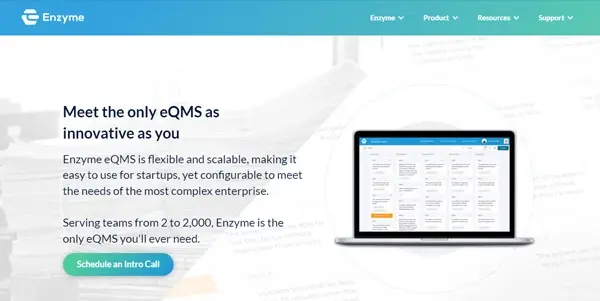Enzyme

AI-assisted software that oversees all stages of your product development
Enzyme: AI-Powered Product Development Orchestration
Enzyme is an AI-assisted software designed to streamline and optimize all stages of product development, from ideation to launch. Categorized as a business and productivity tool, Enzyme leverages artificial intelligence to provide a centralized platform for managing complex projects and improving team collaboration. This article delves into its functionalities, benefits, applications, competitive landscape, and pricing.
What Enzyme Does
Enzyme acts as a central nervous system for your product development lifecycle. It goes beyond simple project management by integrating AI to automate tasks, predict potential roadblocks, and provide data-driven insights to enhance decision-making. Essentially, it orchestrates the entire process, allowing teams to focus on strategic initiatives rather than getting bogged down in administrative details. It facilitates communication, tracks progress, manages resources, and provides a holistic view of the project's health.
Main Features and Benefits
Enzyme boasts a range of features designed to improve efficiency and accelerate product development:
- AI-Powered Task Management: Automates task assignment, prioritization, and scheduling based on project dependencies and team availability. This minimizes manual intervention and optimizes workflow.
- Real-time Progress Tracking: Provides a comprehensive dashboard visualizing project progress, identifying bottlenecks, and highlighting potential delays. This enables proactive issue resolution and improved forecasting.
- Collaborative Workspace: Offers a centralized platform for communication, file sharing, and team collaboration. This fosters transparency and improves communication efficiency.
- Resource Allocation Optimization: Intelligently allocates resources (personnel, budget, time) based on project needs and individual capabilities. This ensures optimal resource utilization and minimizes waste.
- Risk Assessment and Mitigation: Utilizes AI algorithms to identify potential risks and vulnerabilities throughout the development process, allowing for proactive mitigation strategies.
- Data-Driven Insights: Generates reports and analytics on project performance, identifying areas for improvement and providing valuable data for future projects.
Key Benefits:
- Increased Productivity: Streamlines workflows and automates repetitive tasks, freeing up team members to focus on high-value activities.
- Improved Collaboration: Facilitates seamless communication and collaboration among team members, regardless of their location.
- Reduced Development Time: Optimizes resource allocation and identifies potential delays early on, accelerating the overall development process.
- Enhanced Decision-Making: Provides data-driven insights to support informed decision-making at every stage of the product lifecycle.
- Reduced Risk: Proactively identifies and mitigates potential risks, reducing the likelihood of project failures.
Use Cases and Applications
Enzyme's versatility makes it applicable across various industries and project types. Examples include:
- Software Development: Managing agile sprints, tracking bug fixes, and coordinating releases.
- Hardware Development: Overseeing complex manufacturing processes, managing supply chains, and tracking component availability.
- Marketing Campaigns: Planning and executing marketing initiatives, tracking campaign performance, and optimizing resource allocation.
- Product Design: Managing design iterations, coordinating feedback from stakeholders, and ensuring timely completion.
Comparison to Similar Tools
While several project management tools exist, Enzyme distinguishes itself through its AI-powered capabilities. Tools like Asana, Trello, and Jira focus primarily on task management and collaboration. Enzyme builds upon these functionalities by incorporating AI for predictive analytics, automated task prioritization, and risk assessment, making it a more powerful and comprehensive solution for complex product development. Direct competitors might include specialized AI-driven project management platforms, but Enzyme's focus on the entire product lifecycle offers a broader scope.
Pricing Information
Enzyme operates on a paid subscription model. Specific pricing details are usually available on their official website and may vary depending on the chosen plan and the number of users. It's advisable to contact Enzyme directly for a customized quote based on your organization's needs. They typically offer tiered pricing plans, ranging from basic to enterprise-level solutions.
In conclusion, Enzyme presents a compelling solution for organizations seeking to streamline and optimize their product development processes. Its AI-powered capabilities offer a significant advantage over traditional project management tools, enabling enhanced efficiency, improved collaboration, and data-driven decision-making. The cost of the software needs to be weighed against the potential return on investment in terms of reduced development time, improved product quality, and increased overall profitability.